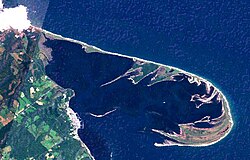| Notsuke Peninsula 野付半島 | |
|---|---|
| Peninsula | |
 | |
  | |
| Coordinates: 43°36′12″N 145°17′34″E / 43.603265°N 145.292732°E / 43.603265; 145.292732 | |
| Location | Shibetsu & Betsukai, Hokkaidō, Japan |
| Dimensions | |
| • Length | 26 kilometres (16 mi) 28 kilometres (17 mi) |
| Ramsar Wetland | |
| Official name | Notsuke-hanto and Notsuke-wan |
| Designated | 8 November 2005 |
| Reference no. | 1552 |
The Notsuke Peninsula (野付半島, Notsuke hantō) is a peninsula on the east coast of Hokkaidō, Japan, with its northwestern base in Shibetsu and southeast tip in Betsukai. The name is derived from the Ainu for jawbone, notkeu (ノッケウ), purportedly due to the landform's visual resemblance to that of a whale. The curved peninsula, the longest sandspit in the country, with a length of some 26 kilometres (16 mi) to 28 kilometres (17 mi), extends into the Nemuro Strait, which lies between Shiretoko Peninsula, Nemuro Peninsula, and the disputed island of Kunashiri in the Sea of Okhotsk; it was formed by the deposition of sand sediment carried by the currents in the strait, and itself forms and largely encloses Notsuke Bay. There remain on the peninsula traces of Satsumon culture pit dwellings, while during the Edo period samurai were stationed at a checkpoint controlling the crossing to Kunashiri. It is said that from the Edo period to the beginning of the Meiji period there was a settlement known as Kiraku (キラク) at the tip of the peninsula, with streets lined with samurai residences and even pleasure quarters, but this is not shown on contemporary maps and is poorly attested in the literature. Prominent features today include withered and eroded stretches of Sakhalin fir (Abies sachalinensis) at Todowara (トドワラ) and Mongolian oak (Quercus crispula) at Narawara (ナラワラ), while to be found in the Notsuke Peninsula Primeval Flower Garden near Notsukezaki Lighthouse towards the eastern tip are the Kamchatka lily, Japanese iris, sea pea, Rosa rugosa, Eriophorum vaginatum, and Hemerocallis esculenta (エゾカンゾウ). The c.15 kilometres (9.3 mi) stretch of Hokkaido Prefectural Road Route 950 (ja) from the base of the peninsula to the nature centre is commonly known as the "Flower Road" (フラワーロード). Together with Notsuke Bay, Notsuke Peninsula has been designated a Ramsar Site, a Special Wildlife Protection Area, and an Important Bird Area, and forms part of Notsuke-Fūren Prefectural Natural Park.
See also
References
- ^ 北海道遺産・野付半島と打瀬舟 [Hokkaido Heritage: Notsuke Peninsula and Utase Boats] (in Japanese). Hokkaido Prefectural Government. 8 November 2011. Retrieved 1 April 2021.
- ^ "Notsuke-hanto and Notsuke-wan" (PDF). Ministry of the Environment. Retrieved 1 April 2021.
- "Notsuke-hanto and Notsuke-wan". Ramsar Sites Information Service. Retrieved 23 July 2021.
- (いいね!探訪記)沈みゆく砂の島、花鳥の楽園 野付半島 北海道別海町・標津町 [A Sinking Sand Island and Paradise of Flowers and Birds, Notsuke Peninsula, Betsukai and Shibetsu, Hokkaido]. Asahi Shimbun (in Japanese). 4 July 2020. Retrieved 1 April 2021.
- ^ 野付半島 [Notsuke Peninsula] (in Japanese). Betsukai Town. Retrieved 1 April 2021.
- "Hokkaido Heritage: The Notsuke Peninsula and the Utase Boats (Betsukai and Shibetsu)" (PDF). Hokkaido Heritage Council. Retrieved 1 April 2021.
- ^ 野付半島 [Notsuke Peninsula] (in Japanese). Nemuro Subprefecture. 14 March 2019. Retrieved 1 April 2021.
- 野付半島・野付湾 [Notsuke Peninsula and Notsuke Bay] (PDF) (in Japanese). Hokkaido Prefectural Government. Retrieved 1 April 2021.
- "Notsuke, Odaitou". BirdLife International. Retrieved 1 April 2021.
- 野付風蓮道立自然公園 [Notsuke-Fūren Prefectural Natural Park] (in Japanese). Hokkaido Prefectural Government. 8 April 2020. Retrieved 1 April 2021.